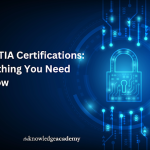A job in information technology [IT] can be likened to entering a vast and complex world with various career pathways and proficiencies to acquire. So, where do you even start? A CompTIA certification is among the most significant methods to begin your IT career if you are new.
In this blog, we’ll review the fundamentals of CompTIA, outlining its definition and emphasising the essential qualifications that can help you get your first IT job. It is recommended that you undergo a CompTIA Course to work effectively in organisations. This is the ideal guide to assist you on your journey, regardless of your curiosity about IT or readiness to get started. Let’s start the blog by explaining What is CompTIA.
What Is CompTIA?
The Computing Technology Industry Association, or CompTIA is an organisation that provides globally recognised and acknowledged IT credentials. CompTIA was founded in 1982 and has certified millions of IT professionals guiding them in developing and progressing in their careers. CompTIA certifications are special because they include general IT abilities that are applicable to many platforms and technologies, not just those of a business like Microsoft or Cisco. This is known as vendor neutrality. Regardless of your level of experience or desire to specialise in a specific area of IT, CompTIA offers a strong foundation that can lead to a variety of career options in the computer sector.
Why Do You Need CompTIA Certifications?
IT beginners find CompTIA certifications exciting for several reasons:
Vendor Neutral
The CompTIA certification programme is not associated with any one vendor such as Cisco or Microsoft. This implies that you will have additional career options because the skills you acquire are transferable to other platforms and technologies.
Widely Recognised
Employers worldwide appreciate CompTIA certificates which are widely recognised. CompTIA certifications are a great asset on your CV because many entry level IT jobs demand them.
Career Flexibility
CompTIA offers certifications in several IT fields including project management, networking, security, and cloud computing. This allows you to select a route that aligns with your professional objectives.
Stepping Stones
CompTIA certifications are meant to be built upon one another. For example you can advance to more specialised certifications like CompTIA A+, CompTIA Network+, and CompTIA Security+ after passing the foundational CompTIA IT Fundamentals [ITF+] test.
Key CompTIA Certifications for Beginners
The following are some of the most essential CompTIA certifications that are appropriate for newcomers to IT:
CompTIA IT Fundamentals (ITF+)
- Ideal For: This certification is for those who are having no background of IT knowledge or are possessing a very less level in IT.
- Overview: The CompTIA ITF+ certification is a good choice for people who are somewhat interested in IT and want to learn more about possible employment in the field. It includes general topics in IT such as the hardware, software, communication networks, databases and security technologies.
- Benefits: This certification helps you in deciding whether you have the right skills to work within IT. It also lays down the basis for higher level certifications by offering a basic guideline for learners.
CompTIA A+
- Ideal For: This certification is ideal for the individuals who are new to the IT industry and willing to start their career as help desk technician, support specialist or IT technician.
- Overview: The CompTIA A+ certification is seen to be the start of most IT careers. It embraces areas such as hardware and networking, portable devices, operating systems and even problems solving skills. To earn this certification you need to pass two exams: The passes include Core 1 [220-1101] and Core 2 [220-1102].
- Benefits: CompTIA A+ certified professionals are highly sought after in the job market. This certification confirms your capacity to manage and fix devices and systems, so you should be an important addition to the company.
CompTIA Network+
- Ideal For: IT professionals interested in networking positions such as system engineers, network administrators, or network technicians should get this qualification.
- Overview: The CompTIA Network+ certification emphasises networking fundamentals such as network infrastructure, protocols, devices, tools, and security. Though not required, it is a sensible next step after receiving the A+ certification.
- Benefits: The Network+ certification is highly recommended for individuals wishing to focus on networking. It demonstrates your familiarity with networking principles and aptitude for administering, preserving, debugging, and setting up networks.
CompTIA Security+
- Ideal For: This certification is designed for IT professionals seeking a specialisation in the security domain, they can be security administrators, security consultants or network security engineers.
- Overview: The Security+ certification is an internationally recognised certification programme which ensures the core security concepts and ideas in the certification holder. It deals with such areas as networks’ security, cryptography, identity, and risk.
- Benefits: This is to say that as threats in cyberspace space persist, so does the need for cybersecurity personnel. Security+ certification is necessary for virtually all the entry level cybersecurity positions and can prepare the candidate well for the advanced level security certifications.
Getting Started with CompTIA
Now that you are aware of the essential CompTIA certifications, the following is how you may begin:
Set Your Goals
Consider the IT topic that most interests you. Are you interested in networking, cybersecurity, or hardware and troubleshooting? Being aware of your career ambitions will make choosing the appropriate certification path easier.
Study and Prepare
CompTIA certifications require a solid grasp of the subject matter. Invest in high quality study resources including books, online courses, and test prep. CompTIA provides official study guides and eLearning choices to aid in your efficient preparation.
Get Hands-On Experience
Since IT is a practical field, you should have hands-on experience. Create a home lab where you can practise setting up networks, troubleshooting hardware, and system security. This experience will strengthen your theoretical knowledge.
Take the Exam
You can take the CompTIA exam online or at a Pearson VUE testing centre after you are satisfied with your knowledge and abilities. Examine the goals and take practice exams to make sure you are prepared.
Keep Learning
CompTIA certificates are valid for three years. To maintain them, you must obtain continuing education units [CEU] through additional training, certifications, or passing a recertification exam.
Conclusion
CompTIA certifications are a best place to start for anyone wishing to enter or grow in the IT industry. The Knowledge Academy provides the resources to help you on this journey. These certifications open various work options by emphasising transferable practical skills applicable to other IT sectors. Whether you want to specialise in a particular field or are just starting in IT, CompTIA offers a rewarding and straightforward route to success.
Aim for the CompTIA A+ or ITF+ certification when you’re ready to start and work your way up from there. Your path to a rewarding and successful IT profession will be paved with hard work, study, and practical experience.










